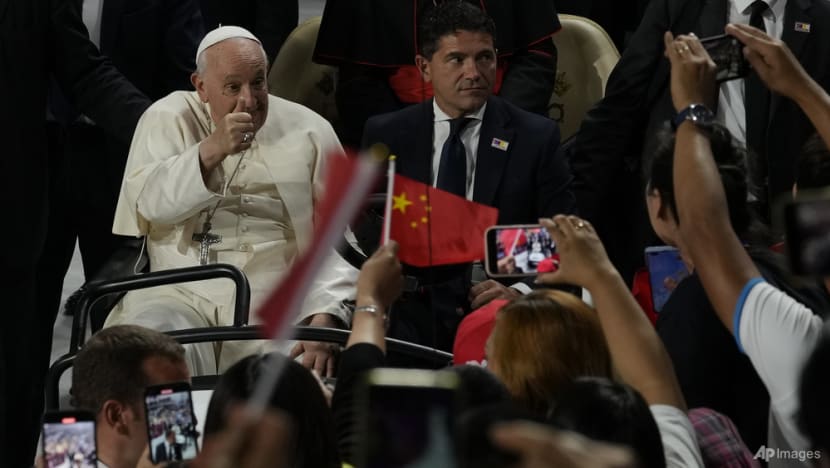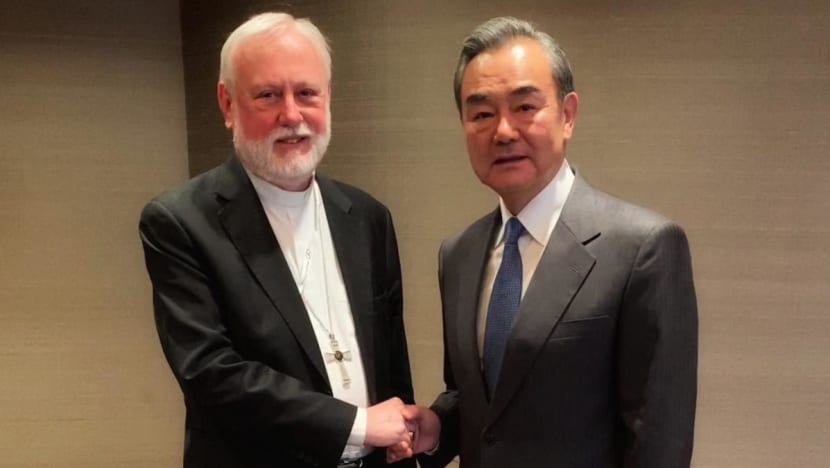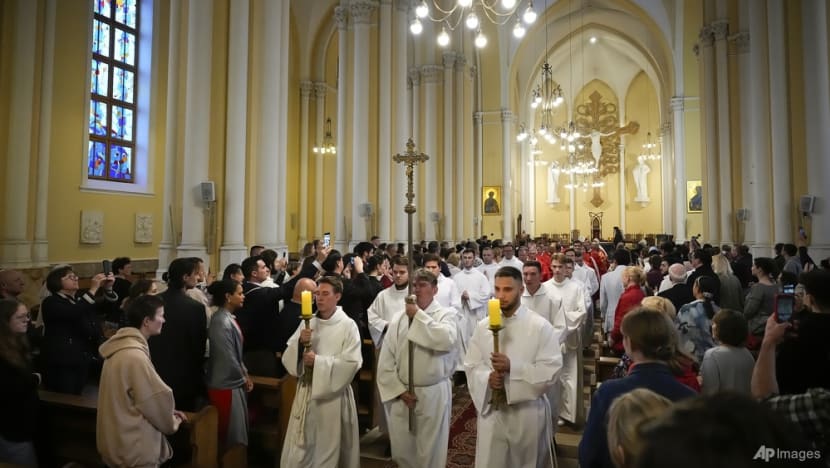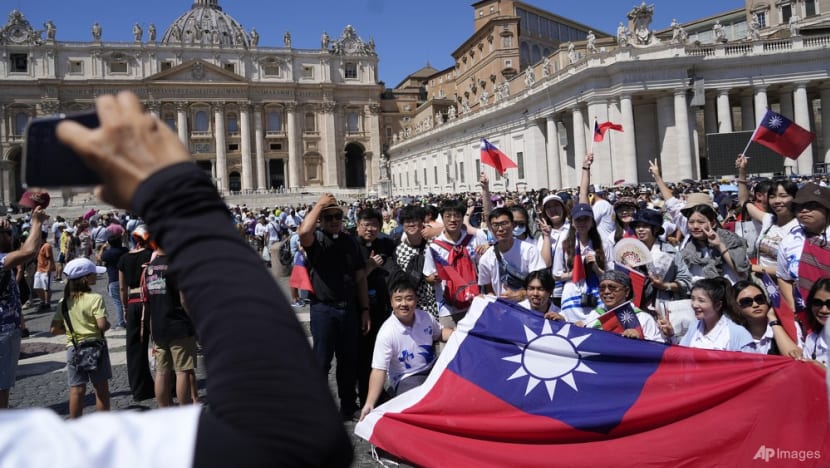Analysis: As China-Vatican deal nears renewal, warming ties could shake Holy See’s decades-old alliance with Taiwan
The twice-renewed agreement centres on the appointment of bishops. While the terms are strictly confidential, analysts say what is of greater import to Beijing are the geopolitical gains and gaining more oversight over an underground Catholic following.


This audio is generated by an AI tool.
SINGAPORE: As a 2018 landmark pact between China and the Vatican nears another renewal in October, analysts believe it’s likely the bilateral deal will continue as they say it has fared generally well for both sides and advanced their respective agendas, despite occasional friction.
They point out that on the global front, Beijing has been reaping gains from the agreement by burnishing its international standing and countering Western criticism - particularly pertinent in recent years amid heightened geopolitical tensions.
Observers note that it also offers China a crucial window to understanding and engaging with the West, considering the 2,000-year history of the Catholic Church and its prominent role in shaping Western civilisation.
“You cannot have good relations with Western countries without good relations with the Catholic Church,” said former Singapore foreign affairs minister George Yeo, who is an ex-member of the Vatican Council for the Economy, which supervises the Vatican’s financial operations.
A continuation of the twice-renewed agreement on the appointment of bishops will also reap benefits for China on the domestic stage, by fostering greater stability and supervision over the millions-strong Catholic community at home, experts point out.
They add that the gains also flow two ways, pointing out how it advances the Holy See’s pastoral agenda of securing and bolstering the rights of Catholics in China and beyond.
At the same time, warming ties between China and the Vatican could spell trouble for the Holy See’s decades-old alliance with Taiwan. Analysts suggest it could be a precursor to the Vatican, a sovereign state, cutting off formal ties with Taipei.
But whatever the outcome, they don’t expect fundamental change on the ground. The analysts note that the Vatican will likely retain representation in Taiwan while forging closer links in China as part of a long-standing pragmatic approach.
NOT POLITICAL BUT PASTORAL
The provisional accord provides terms for the consecration of bishops with the approval of both Beijing and the Holy See.
“This is not the end of a process. It's the beginning,” said the director of the Holy See Press Office Greg Burke immediately after the pact was first inked on Sep 22, 2018.
“The objective of the accord is not political but pastoral, allowing the faithful to have bishops who are in communion with Rome but at the same time recognised by Chinese authorities.”
The agreement was subsequently renewed in 2020 and 2022. It is unclear whether any changes were made to the deal in both instances as the terms are strictly confidential.
Analysts agree that the agreement is all but certain to be renewed for a third time - a prospect already hinted at by both Beijing and the Holy See.
Vatican Secretary of State Cardinal Pietro Parolin stated as such in June, adding that negotiations were ongoing. Recent signals from Beijing have likewise been encouraging, with the state-run Global Times citing analysts who described Pope Francis’ marathon four-nation Asia-Pacific trip in early September as creating a positive environment for the agreement’s renewal.
Dr Alejandro Reyes, senior fellow at the Centre on Contemporary China and the World at The University of Hong Kong (HKU) told CNA that China and the Vatican have made “notable strides” since signing the agreement.
He highlighted the participation of two Chinese bishops in the Synod of Bishops assembly in October last year as one of the major achievements, along with the ordination of Hong Kong’s Bishop Stephen Chow as a cardinal in the Vatican.
In November, Cardinal Chow facilitated a historic visit by Beijing’s Archbishop Joseph Li Shan, head of China’s state-controlled Catholic church, marking the first official visit by a Beijing bishop to Hong Kong.
The highest-level official encounter between China and the Vatican to date occurred in 2020 when Archbishop Paul Gallagher met with Chinese Foreign Minister Wang Yi on the sidelines of a security conference in Munich.

Dr Reyes noted that the developments reflect the “significant progression” between both parties, even as both do not share formal relations.
Beijing severed diplomatic ties with the Holy See in 1951, after China’s Communist Party (CCP) took power and expelled foreign priests. The Vatican instead maintains official links with Taiwan - one of only a dozen states to do so.
Mr Yeo highlighted that Cardinal Chow, during his visit to the Vatican in May, extended an invitation to Pope Francis to visit Hong Kong. He views the gesture as significant, aimed at reinforcing the city’s role as a bridge between China and the global Catholic community.
Pope Paul VI is the only pontiff to have visited Hong Kong - he made a three-hour stopover in 1970 when it was a British colony, holding mass at Happy Valley racecourse.
“It was an informal invitation, but many eyebrows were raised because the Hong Kong cardinal would not have issued this invitation on his own, without clearance to China,” said Mr Yeo in an interview with CNA late last month.
MORE THAN MATTERS OF FAITH
China has shown a favourable stance toward improving relations with the Vatican, as this aligns with its broader strategic goals of enhancing its international reputation and countering negative portrayals from the West, according to analysts interviewed by CNA.
Dr Reyes from HKU pointed out how Beijing played host last September to Cardinal Matteo Maria Zuppi, the pope’s special envoy for peace in Ukraine. The envoy also met with Mr Li Hui, China's special envoy for Eurasian affairs, marking a “rare and noteworthy diplomatic gesture”.
“Beijing was notably gratified, one might even say chuffed by the Vatican sending a special emissary on Ukraine (to the country) … (as) this signifies the Holy See’s recognition of China’s potential role in facilitating peace in Ukraine,” he said.
Before his mission to Beijing, Cardinal Zuppi visited Kyiv and Moscow in June and Washington in July as part of the Holy See's efforts to bring Ukraine and Russia to the negotiating table.
Since Russian forces swept into Ukraine in February 2022, China has refrained from condemning its ally Moscow, although it has called for a ceasefire and a political solution. This stance, however, has prompted Western accusations that Beijing is enabling Russia’s aggression.
In July, member states of the North Atlantic Treaty Organization (NATO) met in Washington DC and issued a declaration labelling China a "decisive enabler" of the invasion. They called on Beijing to cease "all material and political support" for Moscow, including the supply of dual-use materials that can be used for both civilian and military purposes.
In response, China dismissed these claims as "groundless" and asserted that it has "always been a force for peace and stability."
The Vatican's decision to send a peace envoy to Beijing therefore serves as a counter-narrative to Western reproval, said Dr Reyes.
“It does show that the Vatican is trying to operate in a more pragmatic world. And by pragmatic, one could, by extension, think of it as a so-called multipolar world in which we live,” he added.
“The US does not seem to understand that the world has changed and that it's no longer a US-dominant world, that it's … now multi-civilisational, multilateral.
“I think it's interesting to me that the Vatican, to some extent, has been operating that way (with China).”
Mr Yeo, Singapore’s foreign affairs minister from 2004 to 2011, asserts that China’s efforts to deepen ties with the Holy See are part of its broader strategy to better understand and engage with the West.
“European and Western history is incomprehensible without reference to the Catholic Church, (with the) involvement of bishops and the Vatican, both for good and for ill.
“I believe China’s political relations with the West will (also hinge) on its relationship with the Vatican.”
Dr Michel Chambon, research fellow with the religion and globalisation cluster at the Asia Research Institute, agrees that strengthening ties with the Vatican aligns with China’s ambition to assert itself as a global power.
“(China) cannot, for too long, treat the Catholic Church as just an enemy. It becomes very, very awkward when only (countries like) North Korea and Afghanistan have no diplomatic relationship (with the Vatican) and China too has no formal diplomatic ties with the Vatican. What does (that say) about China itself?”

THE TAIWAN FACTOR
But recent developments indicate a potential upgrade in diplomatic relations could be on the cards, say analysts.
In May, Cardinal Parolin expressed the Holy See’s desire to establish a permanent office in China. Pope Francis has also repeatedly expressed his wish to make an apostolic visit to China.
Any move by the Vatican to establish formal relations with China would mean a severing of ties with Taiwan, as that is a prerequisite under Beijing’s “One China” policy.
For nearly eight decades, the Vatican has maintained formal diplomatic relations with Taiwan. It is Taipei’s sole European ally in an overall list of states that has dwindled to 12 from 22 over the past eight years as nations switched sides to China.
When asked whether the recent developments as well as overtures by the Vatican could eventually lead to the Holy See switching diplomatic recognition to China, Mr Yeo did not rule out the possibility.
At the same time, he emphasised that from the Vatican’s perspective, such a move would not signal a shift from its “One China” policy.
“In fact, the Vatican tells China (it) did not want to leave Beijing. (The Vatican was) kicked out of Beijing (and) the moment you allow it back, (it will be) back,” he said.
Taipei is clear-eyed on this and understands that even if the Vatican switches sides to China, it doesn’t mean the church will withdraw completely from the island, he added.
“Taiwan knows this, that the (Catholic) Church does not hold a ‘Two China’ policy’. But (even) if the (diplomatic recognition) moves to Beijing, the Church will still have representation in Taiwan,” said Mr Yeo.

Dr Reyes from HKU agreed with Mr Yeo, noting that the Vatican hasn’t appointed an ambassador to Taipei for over five decades.
The position of nuncio, meaning "messenger" in Italian and equivalent to an ambassador, has remained vacant since 1971, when the United Nations passed a resolution recognising China's representatives as the sole legitimate ones of the country.
Dr Reyes added that a shift in official recognition to Beijing would not compromise the church's independence in Taiwan. At the same time, he believes Beijing is not prioritising pressuring the Vatican to switch diplomatic recognition from Taiwan.
Unlike past efforts to win over Taiwan’s allies in the South Pacific, where strategic and military interests are at play, relations with the Vatican “involve millions of Catholic worshippers within China”, explained Dr Reyes.
“The Chinese and the Vatican understand it'll take time. There has to be more trust built before they can even consider how you would shift diplomatic recognition.
“I can see it as being an important thing for Beijing, but not necessarily a priority that they see as achievable anytime soon.”
OVERSEEING THE CATHOLIC FAITHFUL
Since Beijing and the Holy See severed diplomatic ties in 1951, China’s Catholics have been split between those who worship in the state-controlled chapter and those who remain loyal to the Pope, attending underground churches that operate outside government oversight.
According to official statistics, China has around six million Catholics who worship in churches overseen by the Chinese Catholic Patriotic Association (CPCA), which is under the CCP’s supervision.
However, the actual number of Catholics is believed to be much higher, with some estimates, including those from Western media, suggesting an additional six million worship in so-called underground churches that remain loyal to the pope’s authority.
Churches under the CPCA operate within state laws and regulations, do not openly recognise the pope’s authority, and appoint bishops independently of the Vatican. In contrast, unregistered churches fully follow the pope’s authority and adhere strictly to Catholic doctrine. They often worship discreetly in the homes of fellow believers.
In recent times, the lines between both factions have become increasingly blurred as the bishop-appointment pact between Beijing and the Holy See takes deeper root.
Last month, the Chinese government officially recognised Bishop Melchior Shi Hongzhen, 95, who has led the diocese of Tianjin since 2019. Bishop Shi is believed to be the first Catholic bishop officially acknowledged by the government who is not a member of the state-sponsored Chinese Patriotic Catholic Association.
In June, Beijing and the Holy See jointly appointed Giuseppe Yang Yongqiang, a senior member of the Chinese Catholic Patriotic Association, as the bishop of Hangzhou, transferring him from Zhoucun district in Shandong province. This appointment aligns with the terms of the agreement renewed in 2022, the Vatican said in a statement that month.
Dr Reyes noted that these developments are significant in encouraging underground Catholic worshippers to join the state-controlled chapter, as authorised churches are now led by bishops who pledge allegiance to the pope and adhere to Catholic doctrine.
He said this is also advantageous for the government, as more worshippers coming into the open reduces concerns about undesirable underground activities, such as radicalism or criminal behaviour.
“In other words, the church hierarchy in China then becomes both state-approved and Vatican-approved, then the need or impetus for the underground church is diminished.
“The logic would be that the underground church would become unnecessary to be underground.”
Dr Reyes noted that Bishop Shi’s acceptance by state authorities and his agreement to a state recognition formula could serve as a model for resolving the impasse that has kept numerous bishops underground and vulnerable to state persecution.
The crux is whether Beijing will ease its supervision over the Catholic community and adopt a more passive monitoring role, especially if relations with the Vatican are formalised at some point.
Even if the Chinese government lets up, Dr Reyes cautioned that there is concern Beijing might later revert to a more restrictive stance, potentially cracking down on underground worshippers who were initially encouraged to worship openly.
“If Beijing draws these worshippers out in the open and then cracks down on them, that would be a problem, that would probably be the first crisis in the renewed diplomatic relationship, if there is one,” he said.
“That has to be kind of factored in before the Vatican goes fully down this road (of establishing formal ties with China).”
Related:
PAVING A PATH OF PRAGMATISM
Despite some encouraging signs, analysts CNA spoke with noted that relations between China and the Vatican have not been without friction, with critics pointing to several instances where Beijing violated the terms of their bilateral agreement.
In November 2022, China unilaterally appointed what it called an "auxiliary bishop of Jiangxi" in a diocese not recognised by the Holy See. A second breach followed in April 2023 when Beijing installed a new bishop in Shanghai without Vatican approval.
Both unilateral moves were called out by the Holy See but were retrospectively accepted, with the Vatican citing the “greater good” of the worshippers in their respective dioceses.
Additionally, religious leaders seen as dissenters from the state-controlled church continue to face persecution, such as Bishop Peter Shao Zhumin of Wenzhou, who was arrested in January this year.
Still, Dr Reyes from HKU observed that exchanges between the two sides since the agreement's last renewal in 2020 are seen as a win - not just for China, but for the Vatican, whose main agenda includes defending and bolstering the rights of Catholics all over the world.
“These criticisms are important as they remind the Vatican to stay true to its values, even while taking a more pragmatic approach in China,” he said.
“But we have to be realistic — while it remains an authoritarian system, conditions for many have improved compared to the past. The Holy See’s pragmatism reflects this understanding.”
In his remarks to journalists on May 21, Cardinal Parolin was guarded about the possibility of having a papal representative in Beijing, saying: “It’s always difficult to make predictions.”
“We hope, for a long time now, to have a stable presence in China, even if initially it might not have the form of a pontifical representative of an apostolic nunciature,” he said, adding that the point is to “increase and deepen” contact.
“This is our aim. The form can be different, we are not fixed on only one way. We hope that with the passing of time, the more relations deepen, there will be this step,” he said.
Mr Yeo is hopeful that closer ties between China and the Vatican will lead to broader global stability and mutual understanding. He views their evolving relationship as a potential model for overcoming ideological divides and enhancing international cooperation.
“We should continue to pray that the conditions will be sufficiently favourable on both sides so that the pope can visit China.
“Not just to make a tourist visit, but to plant a paving stone for reconciliation between perhaps the two largest congregations in the world, the Chinese people and the Catholics.”
















